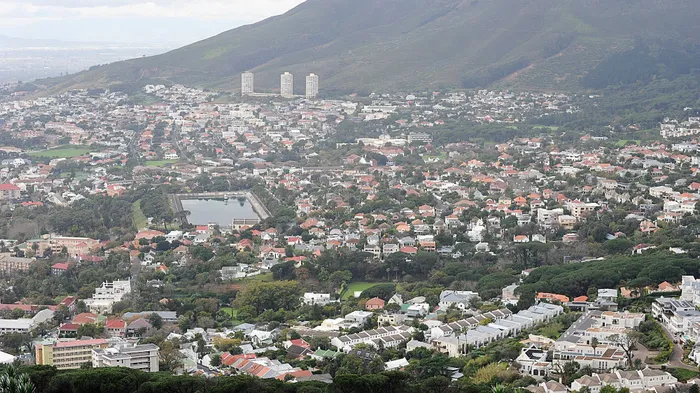
Despite seasonal lulls and economic uncertainty affecting property transactions, regional shifts in buyer interest indicate ongoing opportunities in the South African property market.
Image: Leon Lestrade.
While the volume of property sales decreased overall in the first quarter of this year, house prices still strengthened slightly.
This is according to the REMAX National Housing Report Q1 2025 released on Monday which showed that the first quarter of 2025 produced a mixed bag of results.
Referring to national deeds office information, in terms of units sold, the South African market was said to be down by roughly 8%.
Adrian Goslett, regional director and CEO of RE/MAX of Southern Africa, said this is not necessarily cause for concern and can be attributed to a few factors.
“Firstly, the timing of the annual National Budget Speech often introduces a degree of uncertainty into the market, as potential buyers adopt a cautious 'wait and see' approach in anticipation of changes to taxes, subsidies, or economic policy.
"In Q1 2025, this effect was compounded by ongoing geopolitical tensions and global economic instability, which influenced inflation and overall consumer confidence,” Goslett said.
Additionally, Goslett highlighted that seasonal trends have historically contributed to lower transaction volumes in the first quarter.
“January is a shorter working month due to the holiday period, and December typically includes a closure of the Deeds Office, which causes a backlog in property registrations and delays in processing.
"These cyclical administrative slowdowns and reduced operational days mean that Q1 is often the quietest quarter for property transfers,” he said.
Despite this, the RE/MAX SA network’s registered sales grew by 6.93% in Q1 2025, while the brand’s reported sales grew by a staggering 10.51%. The average days until marked as sold on remax.co.za for Q1 2025 was just 17.1 days.
“These results demonstrate the strength of our brand and the hard work of our network, especially in a market that is showing signs of overall decline,” Goslett said.
Looking at the provincial and suburb trends, the top 5 most searched suburbs on remax.co.za were Parklands (Western Cape), Westville (KwaZulu-Natal), Bluff(KZN), Summerstrand (Eastern Cape) and Table View (WC).
The regional director and CEO said house price growth in the Western Cape has been among the most robust in the country over recent years, driven by strong demand, perceived lifestyle advantages, and relatively stable municipal governance.
“However, this sustained price escalation appears to be having a dampening effect on demand,” Goslett said.
For the first time in a while, the Western Cape no longer dominates the entire Top 5 list of most searched suburbs on remax.co.za, with only Parklands and Table View making the cut.
Suburbs in KwaZulu-Natal (Westville and Bluff) and the Eastern Cape (Summerstrand) have now edged into the spotlight, suggesting that prospective buyers may be broadening their searches to more affordable coastal alternatives.
This shift was said to likely signal a price resistance threshold being reached in the Western Cape, where affordability concerns are starting to outweigh the province's lifestyle appeal for many middle-class buyers.
“As price sensitivity increases, buyers are turning to regions where they can still enjoy coastal living without the premium price tag, potentially redistributing demand more evenly across provinces,” says Goslett.
There are also signs that some might even make the move back to Gauteng. The province’s proportional contribution to the RE/MAX SA brand increased from 37% of all units sold in Q1 2024 to 39% of all units sold in Q1 2025.
“From an investment perspective, Gauteng remains South Africa’s economic powerhouse, generating the highest provincial GDP. Ongoing infrastructure projects and urban regeneration efforts in key areas, such as Sandton, Rosebank, and parts of Pretoria, signal long-term capital growth prospects.
"For savvy investors, Gauteng presents an opportunity to purchase properties at relatively lower entry points, while still benefiting from high rental demand and gradual capital appreciation, particularly as more buyers shift their focus away from overheated markets in the coastal provinces,” Goslett said.
He said that while seasonal lulls and macroeconomic uncertainty dampened overall transaction volumes, the resilience of RE/MAX SA’s network, coupled with regional shifts in buyer interest, signalled that opportunity still abounds for those who remain informed and proactive.
In the latest FNB Property Market Report, Siphamandla Mkhwanazi, FNB senior economist, said the recent dip in consumer confidence due to heightened global and domestic uncertainty is likely to disproportionately impact the affluent segments, potentially leading to slower sales and price stagnation. He said that in the lower-priced segments, potential interest rate cuts by the South African Reserve Bank (SARB) and a potential 10% increase in the transfer duty threshold could stimulate demand.
These factors suggest a potential shift in demand towards more affordable housing options amid increased uncertainty, he said.
Related Topics:
